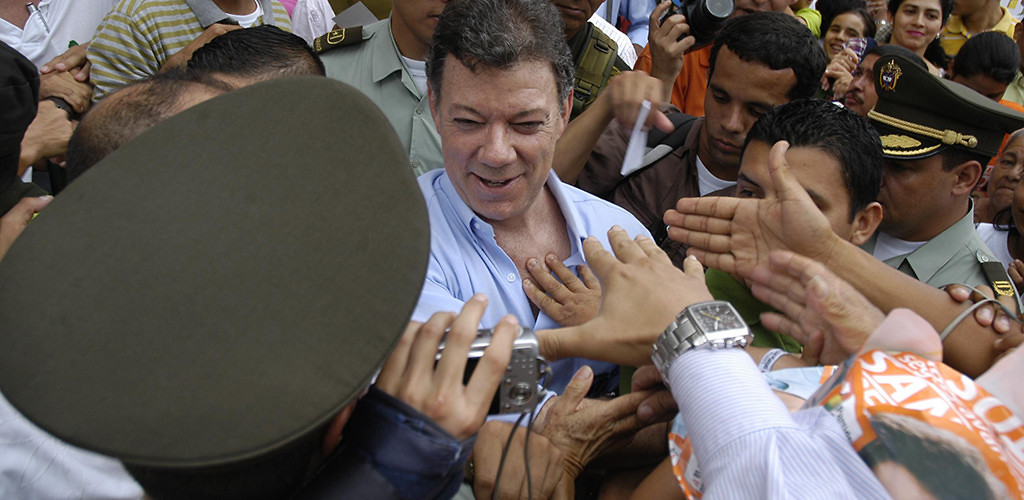Juan Manuel Santos greets supporters during his 2010 campaign. Ibagué, Tolima, May 17, 2010. (Vargas/Flickr)
President Juan Manuel Santos of Colombia was re-elected this past Sunday with a 5-point difference over Oscar Iván Zuluaga, the political heir of ex-president Álvaro Uribe. While Santos’ supporters were relieved to see him win by a wider margin than recent polls had indicated—and this guarantees the continuation of the peace process with the guerrillas—the political polarization that became evident in recent months, and the strong presence of Uribe and his followers in Congress and other important sectors of the state means that Santos should not expect a smooth ride during his second administration, and that a negotiated end to the war is not, by any means, a done deal.
The elections were seen as a referendum on the peace negotiations that the Colombian government and the FARC (Fuerzas Armadas Revolucionarias de Colombia), the country’s largest guerilla group, are conducting in Havana, and which aim to end a 50-year civil conflict. The announcement last week that the second largest guerrilla group—the ELN (Ejército de Liberación Nacional)—is also about to engage in peace negotiations added to this perception. Zuluaga, for most of his campaign, promised that he would end the dialogue if he was elected. Only in the last couple of weeks, as a trade-off to gain the support of the Conservative Party, did he tone down his discourse and state a list of conditions under which he would remain at the table (it was unlikely these would have been accepted by the FARC anyway, as they included a unilateral ceasefire). So, while the expectation that the re-election of Santos would bring peace to Colombia might be an overstatement, Sunday’s results did represent the desire of many to bring a negotiated end to the conflict with the guerrillas.
However, the electoral results highlight levels of political polarization that will certainly be trouble for the continuation and implementation of the peace process. It is clear now that almost half of the country does not trust the peace process and would rather continue trying to defeat the guerrillas in the military field. If, as Santos has promised, the peace process will have to be approved by a popular referendum, significant work will have to be done to make sure what is agreed in Havana passes the public test. And, even if this hump is overcome, the agreements will have to be implemented by a Congress where the opposition party, Centro Democrático—led by ex-president Uribe himself—and other groups opposed to the peace negotiations have a significant number of seats.
Santos can also be sure that the coalition of leftists and progressive forces that came out to support him on Sunday will quickly disappear. Given that Zuluaga had defeated Santos in the first electoral round, and that the polls had indicated a technical draw, the almost million vote difference can be explained by two things. One, that the political parties mobilized their electoral machinery and were able to bring out voters who abstained in the first round. This means the President will be indebted to several political organizations with diverse interests; parties that will have no qualms reminding him of their crucial support, if need be. The second explanation is that the left and the independent progressive sectors—many of which have been actively opposed to Santos during his first administration—closed ranks in his support to prevent the return of the “Uribismo” (as the supporters of the ex-president Alvaro Uribe are known) to power.
Besides the desire to see the peace negotiations continue, the ghost of ex-president Alvaro Uribe was the force that pushed many to vote for a government they had actually opposed over the last four years. Many saw Zuluaga as Uribe’s “pawn,” and thought that electing him would mean endorsing the authoritarian tendencies of the ex-president’s administration. The discourse of Zuluaga and his supporters reproduced Uribe’s core messages: a refusal to admit there is an internal conflict in Colombia, framing it instead as a fight against terrorists and drug dealers; a strong reliance on the military for social control; an appeal to Catholic beliefs; and the rejection of abortion and gay rights. The fear of the return of Uribismo was such that many leftist leaders and their followers—including Bogotá’s mayor, Gustavo Petro—endorsed an administration they had actively criticized for its levels of state corruption, use of force to quell social protest, enactment of policies that benefited a free commerce agreement with the USA over the interests of the peasants, along with criticism of Santos himself for his disregard for international law and support of extractive industries without proper concerns for the environment and the rights of ethnic minorities. This means that many of those who campaigned for Santos will now return to being active in the opposition.
Both Santos and the FARC will need to understand that Sunday’s vote was an endorsement of a meaningful peace negotiation, but not a blank check. Very sensitive issues such as punishment for war crimes, the political participation of the FARC, and how to guarantee victims’ rights are still to be decided in Havana, and the agreements will have to satisfy a significant portion of Colombians if the peace process is to be ratified. And the President will have to adjust his agenda to respond to the concerns of those to his left, who will be indispensable allies to counterbalance the opposition of Uribe and his supporters in Congress. Even if the peace agreements with the guerrillas are signed, important political reforms will have to be approved to guarantee a post-conflict that doesn’t follow the Central-American path, with its turn towards criminality and public insecurity. Santos will have to play his cards very carefully to utilize wisely Sunday’s mandate, and the fragile coalition that was formed—almost in spite of him—around the hope of an end of the war.
Renata Segura is the Associate Director of the Conflict Prevention and Peace Forum of the Social Science Research Council.





